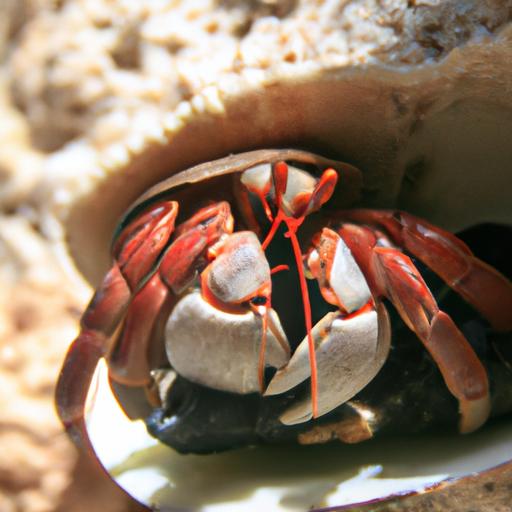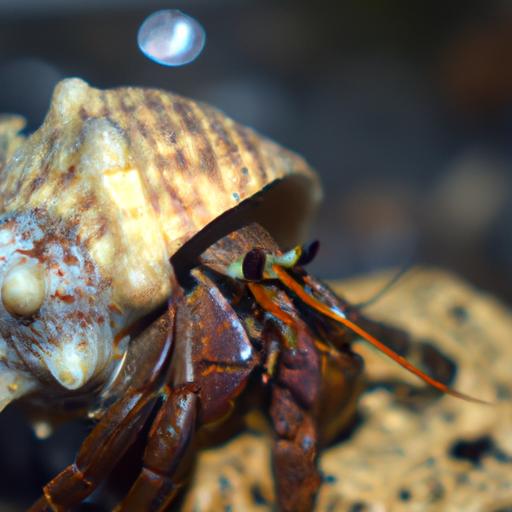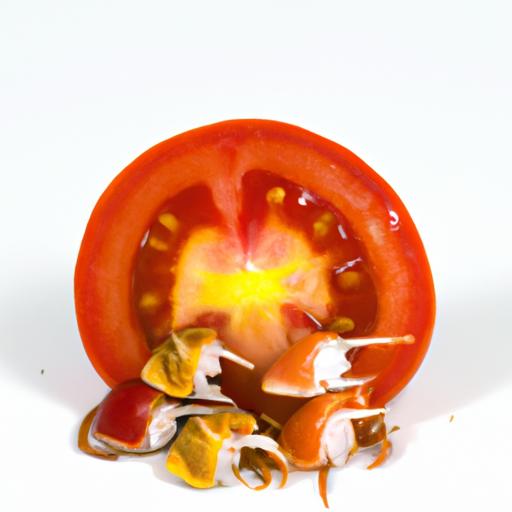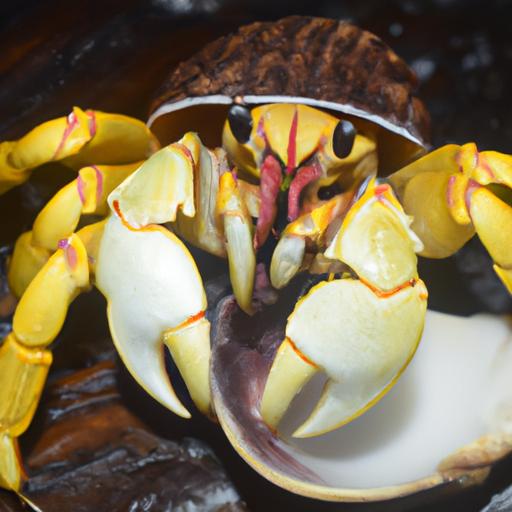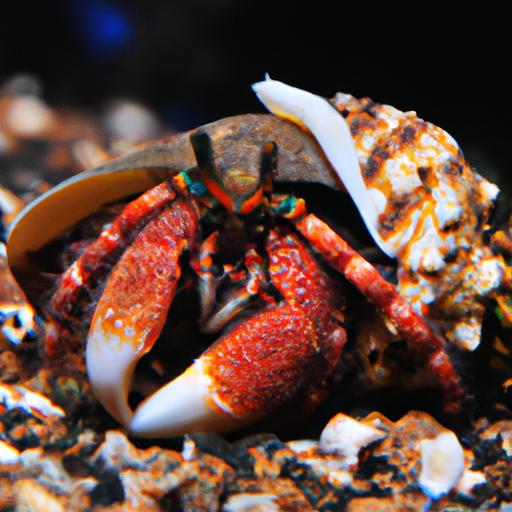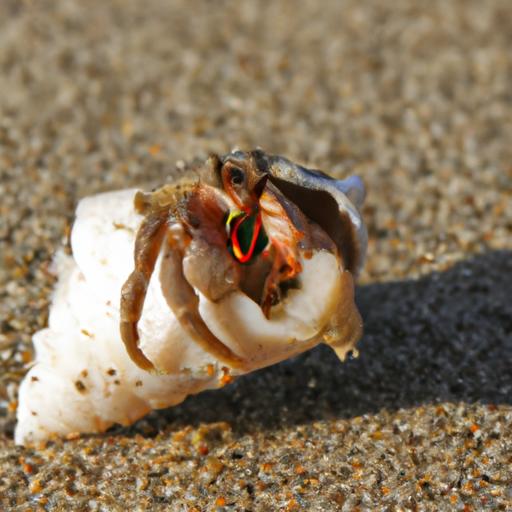Can Hermit Crabs Eat Bloodworms: A Nutritious Addition to Their Diet
Hermit crabs are fascinating and unique pets that require proper care and attention to thrive. One crucial aspect of their well-being is maintaining a balanced diet. Just like humans, hermit crabs need a variety of nutrients to stay healthy and active. While commercial crab food and fresh fruits and vegetables are commonly recommended, there is an intriguing food source that often sparks curiosity among hermit crab owners – bloodworms.
A Closer Look at Hermit Crabs as Pets
Before we delve into the topic of bloodworms as a potential food source, let’s take a moment to understand hermit crabs as pets. These small, land-dwelling crustaceans are known for their unique behavior of using empty seashells as their protective homes. They are omnivorous creatures, meaning they consume both plant and animal matter. This dietary flexibility allows them to explore a wide range of food options.
The Importance of a Balanced Diet for Hermit Crabs
Maintaining a balanced diet is crucial for the overall health and well-being of hermit crabs. A proper diet ensures they receive all the necessary nutrients for growth, molting, and maintaining their exoskeleton. A deficient or imbalanced diet can lead to various health issues, including nutritional deficiencies, weakened immune systems, and even death. Therefore, it’s essential to provide them with a diverse range of food options.
Introducing Bloodworms as a Potential Food Source
Now, let’s turn our attention to bloodworms, a potential addition to your hermit crab’s diet. Bloodworms are the larvae of non-biting midges and are commonly found in freshwater environments. These tiny, reddish worms are packed with essential nutrients that can benefit your hermit crab’s health. Rich in protein, bloodworms can provide the necessary building blocks for their growth and development.
Bloodworms offer a natural source of vitamins and minerals that can contribute to a well-rounded diet for your pet. The high protein content aids in muscle development and repair, while the presence of essential fatty acids supports their overall health. Additionally, bloodworms can stimulate hermit crabs’ natural foraging instincts, providing mental stimulation and preventing boredom.
In the next section, we will explore the natural diet of hermit crabs in the wild and how bloodworms can fit into their nutritional needs. Stay tuned to discover the benefits of incorporating bloodworms into your hermit crab’s diet.
Hermit Crabs’ Natural Diet
Understanding Their Omnivorous Nature
Hermit crabs are fascinating creatures with an omnivorous appetite. This means they have the ability to eat both plant and animal matter. Their natural diet consists of a wide variety of foods that provide them with the essential nutrients they need to thrive. Replicating their natural diet in captivity is crucial for their overall health and well-being.
Exploring the Variety of Foods in the Wild
In the wild, hermit crabs have access to a diverse range of food sources. They scavenge for decaying plant matter, fallen fruits, and leaves, which provide them with essential vitamins and minerals. Additionally, they feed on small insects, crustaceans, and even carrion. This wide variety of food options ensures they receive a balanced diet and all the necessary nutrients required for their growth and survival.
Importance of Replicating Their Natural Diet in Captivity
When keeping hermit crabs as pets, it is vital to replicate their natural diet as closely as possible. This means providing them with a combination of fresh fruits and vegetables, high-quality commercial crab food, and occasional animal protein sources. By offering a diverse range of food options, you can ensure that your hermit crab receives all the necessary nutrients for healthy growth, molting, and overall well-being.
To truly cater to their nutritional needs, consider incorporating bloodworms into their diet. Bloodworms offer a natural source of protein and essential vitamins and minerals. By adding this food source to their diet, you can mimic their natural foraging behavior and provide them with the nutrients they would consume in the wild.
As we move forward, we will explore the nutritional value of bloodworms and how they can contribute to your hermit crab’s overall health. Join me in the next section as we dive into the benefits of incorporating bloodworms into their diet.
Nutritional Value of Bloodworms
A. Overview of Bloodworms as a Nutritious Food Option
When considering the nutritional value of bloodworms, it’s important to recognize them as a highly nutritious food source for hermit crabs. These tiny larvae are not only easily obtainable but also offer a wealth of essential nutrients that can benefit your pet’s overall health.
B. Explanation of Their High Protein Content and Essential Nutrients
One of the key reasons bloodworms are a valuable addition to a hermit crab’s diet is their high protein content. Protein plays a vital role in the growth and development of hermit crabs, supporting the formation of new tissue and aiding in the repair of damaged cells. By incorporating bloodworms into their diet, you provide your hermit crab with a concentrated source of protein that can contribute to their overall well-being.
Bloodworms are also rich in essential nutrients such as vitamins and minerals. These micronutrients are crucial for various bodily functions, including metabolism, immune system support, and maintaining healthy organ function. By offering bloodworms as part of your hermit crab’s diet, you ensure they receive a diverse range of vitamins and minerals that are essential for their optimal health.
C. Discussion on the Benefits Bloodworms Provide to Hermit Crabs’ Health
Incorporating bloodworms into your hermit crab’s diet can bring numerous benefits to their health. The high protein content aids in muscle development and can promote a healthy exoskeleton. Additionally, the essential nutrients found in bloodworms contribute to overall vitality and well-being. By providing a varied diet that includes bloodworms, you are supporting their immune system, promoting proper growth, and enhancing their overall quality of life.
However, it’s essential to maintain a balanced approach when feeding bloodworms to your hermit crabs. While they offer valuable nutrients, they should be a supplemental part of a well-rounded diet and not the sole food source. In the next section, we will discuss how to properly feed bloodworms to your hermit crabs and the precautions to take to ensure their safety and well-being. Let’s explore the guidelines for incorporating bloodworms into your hermit crab’s diet.
Feeding Bloodworms to Hermit Crabs
Guidelines for Introducing Bloodworms into Their Diet
When it comes to incorporating bloodworms into your hermit crab’s diet, it’s crucial to follow some guidelines to ensure a smooth transition and optimal nutrition. Here are a few recommendations to consider:
-
Gradual Introduction: Start by introducing bloodworms in small quantities to see how your hermit crab responds. This allows them to adapt to the new food source without overwhelming their digestive system.
-
Quality Assurance: Ensure that the bloodworms you provide are of high quality and free from any contaminants. Avoid using wild-caught bloodworms, as they may carry parasites or chemicals that can harm your hermit crab.
-
Variety is Key: While bloodworms can be a nutritious addition to their diet, it’s important to offer a variety of food options to ensure a balanced nutrition. Incorporate other suitable foods such as commercial crab food, fresh fruits, vegetables, and calcium supplements.
Recommended Frequency and Portion Sizes for Feeding Bloodworms
Finding the right balance when it comes to feeding bloodworms to your hermit crab is essential. Here are some general recommendations regarding frequency and portion sizes:
-
Frequency: Feed bloodworms to your hermit crab once or twice a week. This allows them to enjoy the benefits of bloodworms without over-relying on them as the sole food source.
-
Portion Sizes: Offer a small portion of bloodworms that is equivalent to approximately the size of your hermit crab’s claw. This helps prevent overfeeding and ensures they receive a varied diet.
Tips for Sourcing and Preparing Bloodworms as a Safe Food Option
To ensure the safety and well-being of your hermit crab, follow these tips when sourcing and preparing bloodworms:
-
Reputable Suppliers: Purchase bloodworms from reputable pet stores or online suppliers that specialize in providing safe and nutritious food for hermit crabs. Read reviews and ask for recommendations from experienced hermit crab owners.
-
Proper Storage: Store bloodworms in a cool, dry place, following the instructions provided by the supplier. Avoid exposing them to extreme temperatures or direct sunlight, as this can compromise their nutritional value.
-
Thorough Rinsing: Before feeding the bloodworms to your hermit crab, rinse them thoroughly with clean water to remove any dirt or debris. This helps ensure that your pet is consuming clean and safe food.
By following these guidelines and taking the necessary precautions, you can introduce bloodworms into your hermit crab’s diet as a nutritious and enjoyable food option. In the next section, we will explore potential risks and precautions related to feeding bloodworms to hermit crabs.
Potential Risks and Precautions
Allergies and Adverse Reactions to Bloodworms
While bloodworms can be a nutritious addition to your hermit crab’s diet, it’s important to be aware of potential allergies or adverse reactions. Just like humans, hermit crabs can have individual sensitivities or allergies to certain foods. Before introducing bloodworms, observe your crab’s behavior and health after consuming other foods. If you notice any signs of allergic reactions such as skin irritations, excessive itching, or changes in their behavior, it’s best to consult a veterinarian for guidance.
Importance of Moderation in Feeding Bloodworms
As with any food, moderation is key when it comes to feeding bloodworms to your hermit crabs. While bloodworms offer numerous benefits, an excessive amount can disrupt the balance of their diet. Remember that hermit crabs require a varied diet to meet all their nutritional needs. Bloodworms should be considered as a supplemental treat rather than the primary food source. Introduce bloodworms gradually into their diet and monitor their response to ensure they are tolerating it well.
Precautions for Ensuring Safety and Well-being
To ensure the safety and well-being of your hermit crabs when feeding them bloodworms, there are a few precautions you should take. Firstly, make sure to source bloodworms from reputable suppliers to ensure their quality and freshness. Avoid feeding your crabs wild-caught bloodworms as they may carry parasites or contaminants. Secondly, thoroughly rinse the bloodworms before offering them to your hermit crabs to remove any potential residue or contaminants. Lastly, always provide a shallow dish of fresh water alongside the bloodworms to ensure proper hydration.
By identifying potential risks, practicing moderation, and taking necessary precautions, you can safely incorporate bloodworms into your hermit crab’s diet. In the next section, we will explore alternative food options that can provide a well-rounded and nutritious diet for your beloved hermit crabs. Stay tuned to discover more!
Alternative Food Options for Hermit Crabs
While bloodworms can be a nutritious addition to your hermit crab’s diet, it’s important to provide them with a variety of food options. A well-rounded diet ensures that they receive a wide range of nutrients necessary for their overall health and vitality. Here are some alternative food choices to consider:
Fresh Fruits and Vegetables
Incorporating fresh fruits and vegetables into your hermit crab’s diet is essential. These natural sources of vitamins, minerals, and fiber provide a balanced nutritional profile. Consider offering small portions of fruits like apples, bananas, and grapes, as well as vegetables such as carrots, spinach, and zucchinRemember to provide them in small, manageable pieces to prevent waste and promote easy consumption.
Commercial Hermit Crab Food
Commercial hermit crab food can serve as a convenient and balanced option for their dietary needs. These specially formulated pellets or powders usually contain a blend of protein, vitamins, and minerals essential for their well-being. Look for high-quality commercial food options that are specifically designed for hermit crabs, and ensure that they are free from harmful additives or preservatives.
Calcium-Rich Foods
Hermit crabs require calcium for proper exoskeleton growth and molting. Providing calcium-rich foods like cuttlebone or crushed eggshells can supplement their diet and support healthy shell development. These items can be placed in their enclosure for them to nibble on as needed.
Protein Sources
In addition to bloodworms, other protein sources can be beneficial for hermit crabs. Small amounts of cooked chicken, fish, or shrimp can be offered as occasional treats. Ensure that these protein sources are unseasoned and cooked thoroughly to eliminate any potential health risks.
Remember, it’s crucial to consult with a veterinarian who specializes in exotic pets to ensure that you are providing a well-balanced diet for your hermit crab. They can provide guidance tailored to your pet’s specific needs and offer valuable insights into their nutritional requirements.
In conclusion, while bloodworms can be a nutritious addition to your hermit crab’s diet, it’s important to provide them with a diverse range of food options. Fresh fruits and vegetables, commercial hermit crab food, calcium-rich foods, and other protein sources can contribute to a well-rounded diet that supports their overall health and vitality. By offering a varied menu, you can ensure that your hermit crab receives the essential nutrients they need to thrive.
